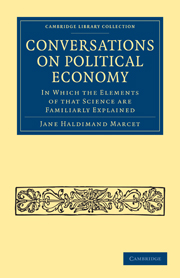Book contents
- Frontmatter
- PREFACE
- Contents
- CONVERSATION I INTRODUCTION
- CONVERSATION II INTRODUCTION—continued
- CONVERSATION III ON PROPERTY
- CONVERSATION IV PROPERTY—continued
- CONVERSATION V ON THE DIVISION OF LABOUR
- CONVERSATION VI ON CAPITAL
- CONVERSATION VII CAPITAL—continued
- CONVERSATION VIII ON WAGES AND POPULATION
- CONVERSATION IX WAGES AND POPULATION—continued
- CONVERSATION X ON THE CONDITION OF THE POOR
- CONVERSATION XI ON REVENUE
- CONVERSATION XII REVENUE FROM LANDED PROPERTY
- CONVERSATION XIII REVENUE FROM THE CULTIVATION OF LAND
- CONVERSATION XIV REVENUE FROM CAPITAL LENT
- CONVERSATION XV ON VALUE AND PRICE
- CONVERSATION XVI ON MONEY
- CONVERSATION XVII MONEY—continued
- CONVERSATION XVIII COMMERCE
- CONVERSATION XIX ON FOREIGN TRADE
- CONVERSATION XX FOREIGN TRADE—cont.
- CONVERSATION XXI ON EXPENDITURE
- INDEX
CONVERSATION X - ON THE CONDITION OF THE POOR
Published online by Cambridge University Press: 07 September 2011
- Frontmatter
- PREFACE
- Contents
- CONVERSATION I INTRODUCTION
- CONVERSATION II INTRODUCTION—continued
- CONVERSATION III ON PROPERTY
- CONVERSATION IV PROPERTY—continued
- CONVERSATION V ON THE DIVISION OF LABOUR
- CONVERSATION VI ON CAPITAL
- CONVERSATION VII CAPITAL—continued
- CONVERSATION VIII ON WAGES AND POPULATION
- CONVERSATION IX WAGES AND POPULATION—continued
- CONVERSATION X ON THE CONDITION OF THE POOR
- CONVERSATION XI ON REVENUE
- CONVERSATION XII REVENUE FROM LANDED PROPERTY
- CONVERSATION XIII REVENUE FROM THE CULTIVATION OF LAND
- CONVERSATION XIV REVENUE FROM CAPITAL LENT
- CONVERSATION XV ON VALUE AND PRICE
- CONVERSATION XVI ON MONEY
- CONVERSATION XVII MONEY—continued
- CONVERSATION XVIII COMMERCE
- CONVERSATION XIX ON FOREIGN TRADE
- CONVERSATION XX FOREIGN TRADE—cont.
- CONVERSATION XXI ON EXPENDITURE
- INDEX
Summary
CAROLINE
IN our last conversation, Mrs. B., you pointed out the evils arising from an excess of population; they have left a very melancholy impression on my mind. I have been reflecting ever since whether there might be any means of averting them, and of raising subsistence to the level of population, rather than suffering population to sink to the level of subsistence. Though we have not the same resource in land as America; yet we have large tracts of waste land, which by being brought into cultivation would produce an additional stock of subsistence.
MRS. B
You forget that industry is limited by the extent of capital, and that no more labourers can be employed than we have the means of maintaining; they work for their daily bread, and without obtaining it, they neither could nor would work. All the labourers which the capital of the country can maintain being disposed of, the only question is, whether it be better to employ them on land already in a state of cultivation, or in breaking up and bringing into culture new lands; and this point may safely be trusted to the decision of the landed proprietors, as it is no less their interest than that of the labouring classes that the greatest possible quantity of produce should be raised. To a certain extent it has been found more advantageous to lay out capital in improving the culture of old land, rather than to employ it in bringing new land into tillage; because the soil of the waste land is extremely poor and ungrateful, and requires a great deal to be laid out on it before it brings in a return.
- Type
- Chapter
- Information
- Conversations on Political EconomyIn Which the Elements of that Science are Familiarly Explained, pp. 152 - 171Publisher: Cambridge University PressPrint publication year: 2010First published in: 1816

